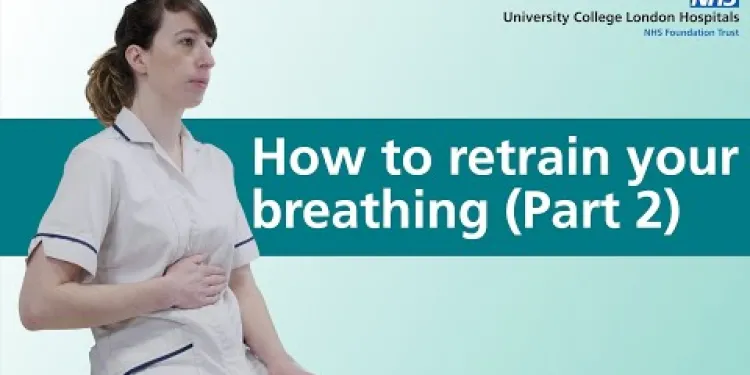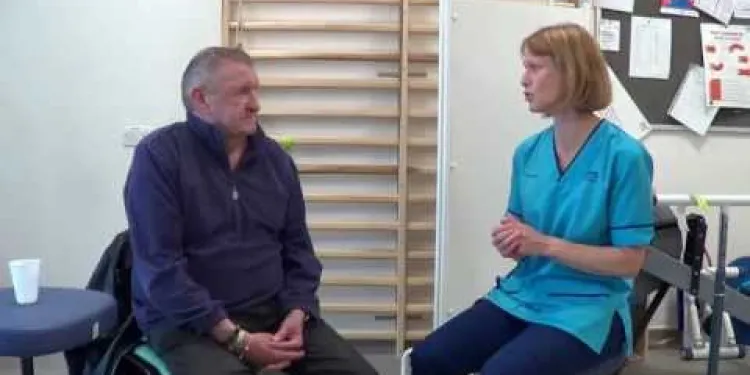Find Help
More Items From Ergsy search
-

What is Asthma?
Relevance: 100%
-

What causes asthma?
Relevance: 95%
-

Are there different types of asthma?
Relevance: 95%
-

Can asthma be cured?
Relevance: 95%
-

Can asthma be fatal?
Relevance: 95%
-

How is asthma treated?
Relevance: 95%
-

Is asthma a serious condition?
Relevance: 95%
-

How is asthma diagnosed?
Relevance: 94%
-

What is an asthma action plan?
Relevance: 92%
-

Can diet affect asthma?
Relevance: 91%
-

An Asthma Explainer with Dr Katherine Hickman
Relevance: 91%
-

What triggers asthma attacks?
Relevance: 91%
-

What are the common symptoms of asthma?
Relevance: 91%
-

Are inhalers the only treatment for asthma?
Relevance: 91%
-

Can children outgrow asthma?
Relevance: 91%
-

Can stress cause asthma symptoms?
Relevance: 88%
-

Is there a link between hay fever and asthma?
Relevance: 87%
-

How can asthma attacks be prevented?
Relevance: 87%
-

Can exercise trigger asthma symptoms?
Relevance: 87%
-

Is asthma more common in certain age groups?
Relevance: 85%
-

How does air pollution affect asthma?
Relevance: 84%
-

How often should someone with asthma see a doctor?
Relevance: 82%
-

Can dust mites cause asthma and eczema?
Relevance: 79%
-

Rise in Childhood Asthma Linked to Air Pollution in Urban Areas
Relevance: 78%
-

What are some common pollutants that affect asthma sufferers in urban areas?
Relevance: 78%
-

Are there mobile apps to track air quality and its impact on asthma?
Relevance: 77%
-

Where can I find information on air pollution and its effect on Asthma for my local area?
Relevance: 75%
-

UK Study Links Poor Air Quality to Increased Asthma Cases in Urban Areas
Relevance: 74%
-

Where can I find research studies on air pollution and asthma in my area?
Relevance: 72%
-

How to retrain your breathing | Part 2 | Asthma, long covid or breathlessness
Relevance: 71%
-

What local organizations provide information on air pollution and asthma?
Relevance: 56%
-

What local organizations provide information on air pollution and asthma?
Relevance: 56%
-

How can I reduce my exposure to air pollution if I have asthma?
Relevance: 55%
-

Where can I find general information about air pollution and asthma?
Relevance: 53%
-

Understanding and Managing Respiratory Illnesses in Families
Relevance: 33%
-
Should individuals with certain medical conditions avoid aspirin?
Relevance: 33%
-

Clearing Your Chest with Breathing Exercises
Relevance: 26%
-

What is air physiotherapy?
Relevance: 26%
-

What are some common conditions treated with homeopathy?
Relevance: 26%
-

Who is at risk of developing eczema?
Relevance: 26%
An Asthma Explainer with Dr Katherine Hickman
What is Asthma?
Asthma is a chronic respiratory condition that affects the airways, causing them to become inflamed and narrow. This leads to difficulty in breathing, shortness of breath, chest tightness, and coughing. According to Asthma UK, approximately 5.4 million people in the UK are currently receiving treatment for asthma.Symptoms and Triggers
Asthma symptoms vary from person to person and can range from mild to severe. Common symptoms include wheezing, coughing, shortness of breath, and chest tightness. Several factors can trigger asthma symptoms, such as allergens (like pollen, dust mites, and pet dander), respiratory infections, cold air, smoke, and stress.Diagnosis and Management
Dr. Katherine Hickman, a respected expert in respiratory health, emphasizes the importance of a proper asthma diagnosis. Diagnosis typically involves a detailed medical history, physical examination, and lung function tests such as spirometry. Once diagnosed, asthma can be effectively managed with a combination of preventative and reliever inhalers, as well as lifestyle changes like regular exercise and avoiding known triggers.Treatment Options
The primary goal of asthma treatment is to control symptoms and prevent flare-ups. Preventative inhalers (also known as corticosteroid inhalers) help reduce inflammation in the airways over time. Reliever inhalers (usually containing bronchodilators) provide immediate relief by relaxing the muscles around the airways. Additional medications like leukotriene receptor antagonists or long-acting bronchodilators might be prescribed in more severe cases.Living with Asthma
Living with asthma requires ongoing management and awareness. Dr. Hickman advises patients to have a personalized asthma action plan, which outlines how to monitor symptoms, adjust medication, and know when to seek medical help. Regular check-ups with healthcare providers are crucial to ensure the condition remains well-controlled. Asthma doesn't have to limit one's quality of life; with proper management, individuals can lead active and fulfilling lives.Conclusion
Asthma is a manageable condition with the right approach and treatment. Understanding the symptoms, triggers, and available treatments can significantly improve the quality of life for those affected. Dr. Katherine Hickman's expertise highlights the importance of personalized care and consistent monitoring in effectively controlling asthma and minimizing its impact on daily life. For more detailed information and resources, individuals can visit the Asthma UK website or consult with their healthcare provider.An Asthma Guide with Dr. Katherine Hickman
What is Asthma?
Asthma is a long-term illness that affects your breathing. It makes the tubes in your lungs swollen and narrow. This can make it hard to breathe, and you might cough or feel tight in the chest. In the UK, about 5.4 million people are getting help for asthma.Symptoms and Things That Cause Asthma
Asthma signs can be different for everyone. Common signs include wheezing, coughing, hard breathing, and tightness in the chest. Asthma can get worse from things like pollen, dust, pets, cold weather, smoke, and stress.Finding Out and Taking Care of Asthma
Dr. Katherine Hickman says it's important to know if you have asthma. To find out, doctors look at your health history, check your body, and do breathing tests. Once you know you have asthma, you can take care of it with inhalers and by living healthy. This includes staying away from things that make your asthma worse.Ways to Treat Asthma
The main goal is to keep asthma calm and stop bad attacks. There are two main types of inhalers. Preventative inhalers help keep the lungs clear over time. Reliever inhalers help quickly when you're having trouble breathing. Some people might need extra medicine if their asthma is bad.Living with Asthma
People with asthma need to watch it carefully. Dr. Hickman says it's good to have an asthma plan. This plan helps you know what to do if your asthma gets worse. You should also go to the doctor often to make sure your asthma is under control. With the right care, you can do many things and enjoy life.Conclusion
You can manage asthma with the right help and medicine. Knowing the signs, what makes it worse, and how to treat it can make life better. Dr. Katherine Hickman helps show how personal care and keeping an eye on asthma help control it every day. For more help and information, you can visit the Asthma UK website or talk to your doctor.Frequently Asked Questions
What is asthma?
Asthma is a common, long-term condition that affects the airways in your lungs, causing them to become inflamed and narrow, making it hard to breathe.
What are the common symptoms of asthma?
Common symptoms of asthma include wheezing, shortness of breath, chest tightness, and coughing, especially at night or early in the morning.
What triggers asthma symptoms?
Asthma symptoms can be triggered by allergens, cold air, smoke, exercise, respiratory infections, and stress.
How is asthma diagnosed?
Asthma is diagnosed through a combination of medical history, physical exams, and breathing tests like spirometry.
What is a peak flow meter and how is it used?
A peak flow meter is a handheld device used to measure how fast you can blow air out of your lungs, which helps monitor your asthma control.
What types of medication are used to treat asthma?
There are two main types of asthma medications: relievers (quick-relief inhalers) and preventers (long-term control inhalers).
Are there any side effects of asthma medications?
Common side effects of asthma medications can include oral thrush, hoarseness, and, in rare cases, more serious effects like heart palpitations.
Can asthma go away on its own?
Asthma is a long-term condition and while it can be managed well, there is no cure. Symptoms may improve over time, especially in children.
How often should I see my GP or asthma nurse for an asthma review?
It's recommended to have an asthma review with your GP or asthma nurse at least once a year, or more frequently if your symptoms are not well controlled.
What should I do in case of an asthma attack?
In case of an asthma attack, follow your action plan: use your reliever inhaler, sit up straight, stay calm, and seek emergency medical help if symptoms do not improve.
Can I exercise if I have asthma?
Yes, regular exercise can benefit people with asthma. Consult your GP for advice on managing symptoms and possibly using a reliever inhaler before exercise.
How can I avoid asthma triggers?
Avoiding asthma triggers involves identifying and minimizing exposure to things like allergens, smoke, pollution, respiratory infections, and stress.
Can diet affect asthma?
A healthy diet can support overall well-being and may help with asthma symptoms. Some people find that certain foods trigger symptoms and should consult their GP.
What is an asthma action plan?
An asthma action plan is a written plan developed with your GP or asthma nurse that outlines how to manage your asthma daily and what to do in an emergency.
Is asthma more common in children or adults?
Asthma can occur at any age, but it is more commonly diagnosed in childhood. However, adults can also develop asthma.
What is asthma?
Asthma is when it is hard to breathe. It can make you cough, wheeze, or feel tight in the chest. Asthma can come and go. Sometimes, it can be scary or painful.
To help with asthma, there are tools like inhalers. They help you breathe better. Doctors can show you how to use them. Taking deep breaths and staying calm can also help when you feel breathless.
Asthma is a common problem that lasts a long time. It affects the tubes in your lungs. These tubes can get swollen and small, which makes it hard to breathe.
What signs show someone has asthma?
Signs of asthma are:
- Wheezing (a whistling sound when you breathe)
- Feeling like you can't get enough air
- A tight feeling in your chest
- Coughing, a lot of times at night or in the morning
Tips: Use a picture chart to help remember the signs. Tell an adult if you feel these signs. Breathe slowly when you feel these signs.
What makes asthma symptoms start?
Asthma can make it hard to breathe. Some things can make asthma worse. These things are:
- Dust and pollen
- Cold weather
- Smoke from fires or cigarettes
- Running or playing hard
- Colds and flu
- Feeling worried or upset
If you have asthma, talk to a doctor. They can help you find ways to feel better. You can also use pictures and apps to help you remember what makes it hard to breathe.
How do doctors know if you have asthma?
Doctors find out if you have asthma by doing three things. They ask you about your health, check your body, and use a special test called spirometry to see how well you can breathe.
What is a peak flow meter and how do you use it?
A peak flow meter is a tool to help you check how well you can blow air out of your lungs.
Here is how you use it:
- Stand up or sit up straight.
- Take a deep breath in.
- Blow out as hard and fast as you can into the mouthpiece.
- Write down the number you see on the meter.
- Do this three times and write down the highest number.
The numbers you get can help you and your doctor check how well your lungs are working.
To help remember, you can use pictures or videos showing how to use a peak flow meter.
What is a Peak Flow Meter?
A peak flow meter is a small tool. You hold it in your hand. It measures how fast you can blow air out of your lungs. This helps you see how well you are controlling your asthma.
If you find reading hard, you can:
- Ask someone to read it with you.
- Use a reading app that reads the text out loud.
- Break the text into smaller parts and read slowly.
What medicines help with asthma?
Asthma is when it's hard to breathe. Medicines can help. Here are some types: - Inhalers: These help you breathe easier. You use them to breathe in the medicine. - Tablets: You swallow these, and they help your lungs stay clear. - Shots: These are given with a needle by a doctor. They help a lot when asthma is very bad. It's good to ask a doctor about what works best for you. Keeping a plan with them helps a lot.There are two main kinds of asthma medicines:
- **Relievers**: These are quick-help inhalers. They stop asthma attacks fast.
- **Preventers**: These are long-term control inhalers. They help stop asthma attacks from happening.
If you need help with reading, you can use tools like audiobooks or apps that read text out loud.
Do asthma medicines have side effects?
Asthma medicine can sometimes cause problems. These problems are:
- Getting a white coating in your mouth (called oral thrush).
- Having a rough, scratchy voice (called hoarseness).
- Sometimes, it can make your heart beat really fast. This is rare.
If you have any problems, talk to a doctor or nurse. A tool that can help is a reminder check-list. It can help you keep track of when to use your medicine. You can also use a spacer with your inhaler. This can help stop some of the mouth problems.
Will asthma stop by itself?
Asthma lasts a long time, and we can't make it go away. But we can help control it. Sometimes, asthma gets better, especially in kids.
How often should I visit my doctor or asthma nurse to check my asthma?
It is good to visit your doctor or nurse often to check on your asthma. Here is some advice:
- Visit your doctor or nurse at least once a year for an asthma review.
- If you feel unwell or your asthma changes, see them sooner.
If you need help understanding, ask a friend or family member to come with you. You can also use pictures or notes to help remember what your doctor or nurse says.
See your doctor or asthma nurse once a year to talk about your asthma. Go more often if your asthma is not doing well.
What to Do If You Have Trouble Breathing from Asthma
If you have an asthma attack, here's what to do:
1. Use your special inhaler to help you breathe better.
2. Sit up straight. This helps with your breathing.
3. Stay calm. Try to breathe slowly and relax.
4. If you don't feel better, ask for help right away. Call an ambulance or go to the hospital.
Can I do exercise if I have asthma?
Yes, regular exercise can help people with asthma feel better. Talk to your doctor for advice on how to manage asthma. They might suggest using your inhaler before you exercise.
How can I stay away from things that make my asthma worse?
To help with asthma, try to stay away from things that can make it worse. These things can be:
- Dust and pollen
- Cigarette smoke
- Dirty air
- Getting sick with a cold or the flu
- Feeling very stressed
You can use tools like air filters or apps to check air quality. Also, try to stay calm and take deep breaths.
Can the food we eat change asthma?
Eating good food can help you feel better and might help with asthma. Some foods can make asthma worse, so it's good to talk to your doctor about it.
What is an asthma action plan?
An asthma action plan is a simple guide. It helps people with asthma. It tells them what to do if they feel unwell.
It has steps to follow. For example, it says what medicine to take. It also tells when to ask for help.
Using pictures can make it easier to understand. Ask a doctor or nurse to make a plan with you.
An asthma action plan is a piece of paper with steps written by your doctor or asthma nurse. It tells you how to take care of your asthma every day and what to do if there is an emergency.
Do more kids or adults have asthma?
Asthma can happen to anyone, no matter how old they are. But, lots of kids find out they have asthma when they are young. Still, grown-ups can start to have asthma too.
Useful Links
This website offers general information and is not a substitute for professional advice.
Always seek guidance from qualified professionals.
If you have any medical concerns or need urgent help, contact a healthcare professional or emergency services immediately.
Some of this content was generated with AI assistance. We’ve done our best to keep it accurate, helpful, and human-friendly.
- Ergsy carfully checks the information in the videos we provide here.
- Videos shown by Youtube after a video has completed, have NOT been reviewed by ERGSY.
- To view, click the arrow in centre of video.
- Most of the videos you find here will have subtitles and/or closed captions available.
- You may need to turn these on, and choose your preferred language.
- Go to the video you'd like to watch.
- If closed captions (CC) are available, settings will be visible on the bottom right of the video player.
- To turn on Captions, click settings .
- To turn off Captions, click settings again.
More Items From Ergsy search
-

What is Asthma?
Relevance: 100%
-

What causes asthma?
Relevance: 95%
-

Are there different types of asthma?
Relevance: 95%
-

Can asthma be cured?
Relevance: 95%
-

Can asthma be fatal?
Relevance: 95%
-

How is asthma treated?
Relevance: 95%
-

Is asthma a serious condition?
Relevance: 95%
-

How is asthma diagnosed?
Relevance: 94%
-

What is an asthma action plan?
Relevance: 92%
-

Can diet affect asthma?
Relevance: 91%
-

An Asthma Explainer with Dr Katherine Hickman
Relevance: 91%
-

What triggers asthma attacks?
Relevance: 91%
-

What are the common symptoms of asthma?
Relevance: 91%
-

Are inhalers the only treatment for asthma?
Relevance: 91%
-

Can children outgrow asthma?
Relevance: 91%
-

Can stress cause asthma symptoms?
Relevance: 88%
-

Is there a link between hay fever and asthma?
Relevance: 87%
-

How can asthma attacks be prevented?
Relevance: 87%
-

Can exercise trigger asthma symptoms?
Relevance: 87%
-

Is asthma more common in certain age groups?
Relevance: 85%
-

How does air pollution affect asthma?
Relevance: 84%
-

How often should someone with asthma see a doctor?
Relevance: 82%
-

Can dust mites cause asthma and eczema?
Relevance: 79%
-

Rise in Childhood Asthma Linked to Air Pollution in Urban Areas
Relevance: 78%
-

What are some common pollutants that affect asthma sufferers in urban areas?
Relevance: 78%
-

Are there mobile apps to track air quality and its impact on asthma?
Relevance: 77%
-

Where can I find information on air pollution and its effect on Asthma for my local area?
Relevance: 75%
-

UK Study Links Poor Air Quality to Increased Asthma Cases in Urban Areas
Relevance: 74%
-

Where can I find research studies on air pollution and asthma in my area?
Relevance: 72%
-

How to retrain your breathing | Part 2 | Asthma, long covid or breathlessness
Relevance: 71%
-

What local organizations provide information on air pollution and asthma?
Relevance: 56%
-

What local organizations provide information on air pollution and asthma?
Relevance: 56%
-

How can I reduce my exposure to air pollution if I have asthma?
Relevance: 55%
-

Where can I find general information about air pollution and asthma?
Relevance: 53%
-

Understanding and Managing Respiratory Illnesses in Families
Relevance: 33%
-
Should individuals with certain medical conditions avoid aspirin?
Relevance: 33%
-

Clearing Your Chest with Breathing Exercises
Relevance: 26%
-

What is air physiotherapy?
Relevance: 26%
-

What are some common conditions treated with homeopathy?
Relevance: 26%
-

Who is at risk of developing eczema?
Relevance: 26%


